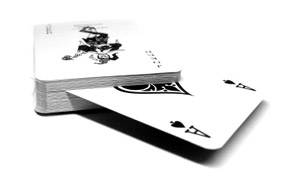
We don't want to give away all the tips you'll find in the Poker Tracker Guide,
but to show you some of what it has to offer, we've included a snippet sample chapter.
The following chapter describes how to set up multiple databases for players
who play more than one "type" of hold 'em (e.g. no-limit and limit or full
ring games and shorthanded ring games).
***
2.6 Different Databases for Different Games
Unfortunately, if you play more than one "type" of hold 'em, there is no easy way to set up Poker Tracker to auto-generate different notes files for each game. For example, if we play No-Limit, shorthanded, and full ring games, we'd really like to have three separate notes files for each type of game. We've developed a method to achieve this functionality, although it requires a bit of manual intervention to make it work.
Step 1 - Copy the main poker tracker database
First we need to create a copy of our current database file. We do this by the following process:
- Right click on the start button and select "explore"
- Navigate to the "Program Files" folder, and then open the "Poker Tracker V2" folder
- Select the file titled "ptrack.mdb" and copy it
- Paste the file into the same directory. You should see a file titled "copy of ptrack.mdb"
- Rename the file to "ptrack2.mdb"
- In the Poker Tracker window, go to the menu option, "File" --> "Maintain
Poker Tracker Database Names"
- Click the button labeled "Add"
- Type in a description for the new database (e.g. pt_shorthanded_db)
- Click on the empty box in the "Database File" column, and select "Browse To Find an Existing Database" from the drop-down menu
- Select the "ptrack2.mdb" file that you just created
- Click the "OK" button
You've now made a copy of your Poker Tracker database, and can open this copy
by going to the menu option, "File" --> "Open Database" and selecting the
new database. We will use this new database to generate a second set of notes
for
one of our other game types.
Step 2 - Back up the notes file
Online poker sites store notes as a simple text file on your machine, and read from this file every time you start the online poker application. For example, PartyPoker's notes file is called "Notes.txt," and stored in the /Program Files/PartyPoker/ directory. When Poker Tracker generates notes, it overwrites this file with information from the database. In order to create a separate set of notes for each game, we will maintain a separate "Notes.txt" file for each game. We do this by simply copying the notes file after we auto-generate our notes, and storing it under a different name. For example, after we run export our notes for full ring games, we copy the notes file (select the file "Notes.txt" in the /Program Files/PartyPoker/ directory) and rename it to "full_ring_notes.txt".
Step 3 - Auto-rate and export notes for your other game
Now that we've stored our exported notes for our first game type, we can use our second database to auto-rate players (based on categorization rules specific to that game) and export notes to a second notes file. For example, we have a separate database and set of auto-rate rules for shorthanded games. We've exported these rules to "Notes.txt" and made a copy of the notes file titled "shorthanded_notes.txt".
Step 4 - Before logging on to the poker site, rename the desired notes file
Now that we have two different notes files, we simply rename the one we wish to use to "Notes.txt" before running the poker application. For example, if we are going to play a shorthanded game, we would delete the current "Notes.txt" and rename the "shorthanded_notes.txt" to "Notes.txt". This ensures that our notes will be read by PartyPoker when we run the application.
This process is a bit time-consuming, but we find it to be the only possible way of maintaining notes of high informational value across games.

